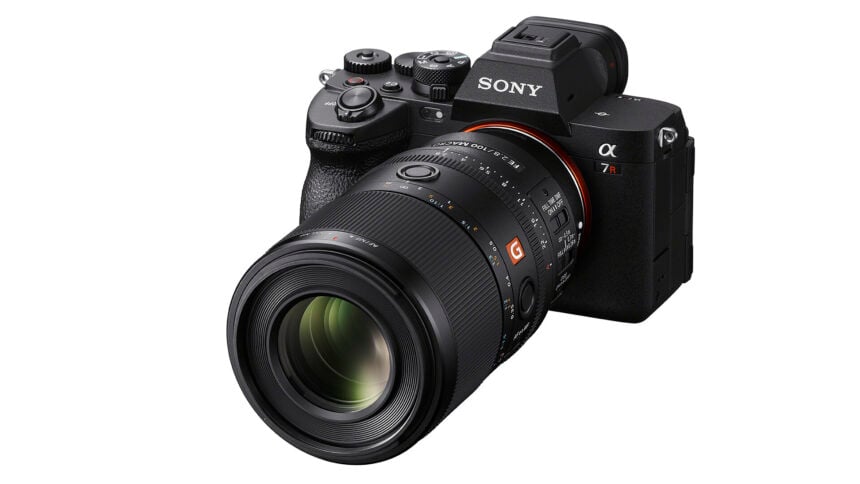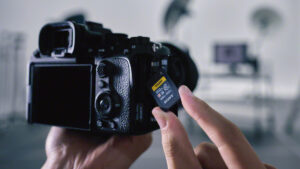Sony has announced the FE 100mm F2.8 Macro GM OSS (SEL100M28GM), the first medium-telephoto macro in its G Master line. It delivers up to 1.4x magnification, built-in optical stabilisation tuned for macro work, and a set of physical controls designed to make close-ups less fiddly. It lands in the UAE in November 2025.
What’s new: a G Master macro that goes “beyond life size”
Sony’s 100mm Macro GM does more than the usual 1.0x. Out of the box it reaches 1.4x, letting you fill the frame with tiny subjects and pull out textures you’d otherwise miss. An optional teleconverter pushes magnification up to 2.8x while keeping distance from skittish or reflective subjects.
- 1.4x native magnification
- Up to 2.8x with teleconverter (sold separately)
- Medium-telephoto working distance
- Suited to flowers, product shots, and small details
- November 2025 UAE availability
In short, this lens aims at creators who want more than life-size macro without going exotic or stacking diopters—and who’d like to avoid casting shadows or spooking a subject by getting too close.
Optical design: sharpness first, bokeh intact
Sony is using two XA (extreme aspherical) elements and two ED elements to keep resolution high from centre to edge and to tame colour fringing. The 11-blade circular diaphragm and carefully tuned spherical aberration aim for that creamy G Master background blur. Nano AR Coating II reduces flare and ghosting when you’re working backlit.
- Two XA + two ED elements
- 11-blade circular aperture
- Bokeh tuned via spherical aberration control
- Nano AR Coating II across the surfaces
The parts list reads like a typical G Master, but the promise here is edge-to-edge clarity at macro distances—often a weak spot for lenses that only quote MTF at infinity. The bokeh talk is standard, yet the 11-blade iris should keep highlights round as you stop down slightly for depth.
Autofocus and handling: built for precise macro pulls
Macro focusing is fussy. Sony adds four XD linear motors for faster, quieter AF—quoted as up to ~1.9× quicker than previous models—plus three focus-centric switches/rings to reduce menu diving. There’s also a clicky aperture ring for direct control.
- Four XD linear motors (quiet, precise drive)
- Full-time DMF: twist the focus ring to jump to MF even in AF
- Focus Mode switch: flip between AF and MF instantly
- Sliding Focus Ring: full mechanical-style MF with distance + magnification scales
- Dedicated aperture ring
Those three focus tools are the bit macro shooters will care about. Being able to override AF, swap modes, or engage a distance-linked manual scale without digging through the camera is the difference between getting the shot and watching the bug fly off.
Stabilisation tuned for close-ups
Inside the barrel is optical stabilisation that compensates not just angular shake, but also shift (X/Y) and front/back movements—wobbles that become obvious at high magnification. That should help handheld macro when a tripod isn’t practical.
- Optical SteadyShot (OSS) for macro distances
- Compensates shift, angular, and front/back shake
Macro stabilisation that accounts for fore-aft breathing is a welcome call; even tiny body sway can throw focus at 1.4x. This system is designed to fight exactly that.
UAE launch details
Sony says the FE 100mm F2.8 Macro GM OSS will be available in the United Arab Emirates from November 2025. Pricing was not shared in the announcement.
- UAE availability: November 2025
- Mount: Sony E (α/Alpha series)
- Product code: SEL100M28GM
If you’re already in the Sony system, this slots in as a premium macro option with extra reach over the classic 90mm macro. The 100mm focal length should give a bit more working distance on full frame while preserving that G Master look.
What cameras does the FE 100mm F2.8 Macro GM OSS support?
It’s designed for Sony E-mount (Alpha) cameras.
What’s the maximum magnification?
1.4x natively; up to 2.8x with a compatible teleconverter sold separately.
Are there physical controls for focus?
Yes. You get Full-time DMF, a Focus Mode switch, and a Sliding Focus Ring linked to distance and magnification scales, plus a dedicated aperture ring.























